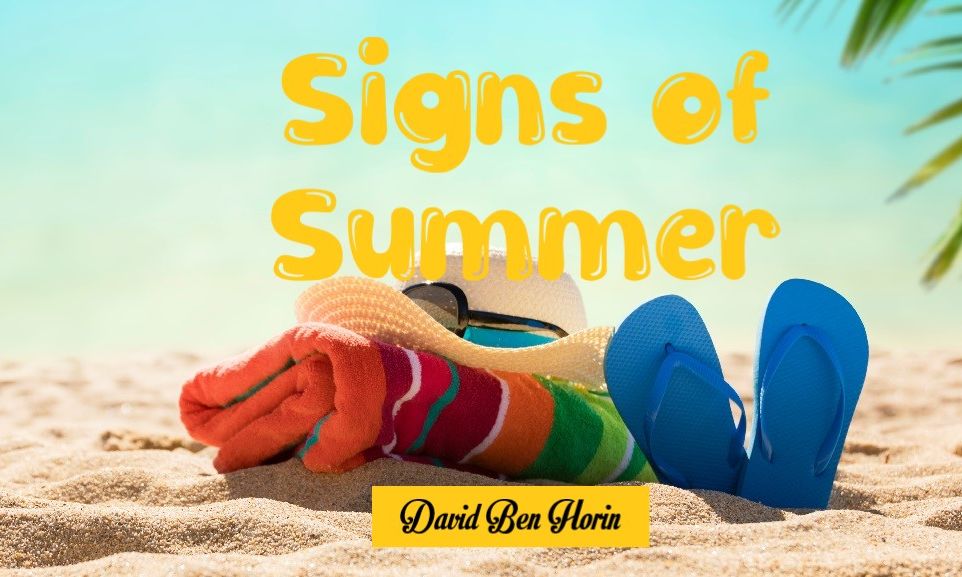
Signs of Summer
Along with the heat and the massive temptation to misuse our limbs, our eyes, and our minds, the summer ushers in the bloom of the dates, the pomegranates, and the olives.

The heat of summer. Here in Afula at the heart of the Jezreel Valley the dry heat has surrendered to the humidity, so the real feel is now double the temperature. All I can think about is what pool of ice-cold water I am going to plunge my overheated self into this Friday. I think I’ll shlep (haul myself) out to a separate beach on the Kinneret, or maybe the new separate beach in Nahariya.
The Land of Israel is won with toil and sweat, but do we have to schvitz (sweat) all the time?
Then there are the sights. The clouds. The birds. The yellow trees with their perfume like fragrance and lemon colored petals. You can see them from kilometers away. And then there is the other unfortunate reality of summer – the way the women dress to beat the heat.
How did that get in there? Let me try again.
The fresh air. The faint breeze. Late Shabbat meals, longer naps, more time to learn in the afternoon. Women walking the streets and the beaches.
Huh?
Summer may be a good medicine for a weary spirit, but it comes with dangerous side effects. Isn’t there something that can help us take a leisurely stroll without falling into the traps along the way?
Baruch Hashem. G-d gives us miracles every year so we can enjoy His summer without the fall.
The Simanim (Auspicious Signs) of Summer
When I think of Rosh Hashanah, I think of what most of us Jews think about – food. Before we bum rush the brisket, we eat the simanim – auspicious foods – at both Rosh Hashanah evening meals. One of the simanim is to eat pomegranates that we should merit a year full of mitzvot. A pomegranate contains 613 seeds to signify the 613 mitzvot. We dip apples in honey for a sweet new year. While the common practice is to use honey made from bees, in Israel we use date honey. Dates are harvested from August to September and while eaten all year around, we see them as an “autumn” food. Both pomegranates and dates are of the seven species of plants that the Land of Israel is blessed.
Olives are also harvested around the High Holy days and they too, are a blessing of the Land of Israel. The olive harvests are right when we are making repentance for our sins – a great many of them committed in the summer.
We read in the Shema that if we follow Hashem’s commandments, He will bless us with rain so we can gather in our grain, our wine, and our oil. If we fail to hold His commandments, He will restrain the Heavens, there will not be any rain, and we will be swiftly banished from the goodly Land which He gives us.
Olives remind us that we must serve Hashem – both by continuing to fulfill the positive commandments like praying and learning Torah every day, and dressing modestly, and also the negative commandments like guarding our eyes – even while on “summer break.” In this way we merit good judgments. Otherwise, we face starvation, exile, and even death.
The Origins of the Harvest
Along with the heat, the eye candy, and the massive temptation to misuse our limbs, our eyes, and our minds, the summer ushers in the bloom of the dates, the pomegranates, and the olives. They all begin to sprout in the summer. They make their debut throughout July and August.
Every day, you see them everywhere in Israel. We take great pride in our blessings and not a city block or park can be found without a pomegranate tree, date palm, or olive tree.
During July, the olives are the size of a popcorn kernel. The pomegranates have the diameter of a plum and they are green. The dates are hard, yellow, and small.
They remind us that the bigger they grow, the closer our Judgment Day. No matter how hot, how humid, how sunny — the sight of the pomegranates take us directly to the Rosh Hashanah table. To the Courthouse. To the prosecutor reading out all of the charges against us.
Before turning away from the emerging bundle of dates raised high above to scan something the contours of my eyes have been seized by, I am reminded of what happens when those dates are ready and thank Hashem for His summer signposts.
Hashem also sent us another reminder, in case the trees all around us weren’t enough. The heavy judgment of Rosh Hashanah is preceded by Elul – the month of teshuva and Selichot when we wake up early every day to ask Hashem to forgive us (Sephardim starting doing Selichot and blowing the shofar already from the first day of Elul, while Ashkenazim start only the last week). The month before Elul is called Av – and this is the month which boasts Bein Hazmanim otherwise known as the Chofesh Hagadol – or “big break.” Everyone is off work, off school, off Yeshiva and off to the beach or wherever else they fancy. Even in the midst of the break of summer, the month itself reminds us of what we are supposed to be doing, and not doing, during this time. Av can be broken into the acronym – “Elul Ba” – “Elul is coming”! Rosh Hashanah is coming! Don’t forget!







Tell us what you think!
Thank you for your comment!
It will be published after approval by the Editor.